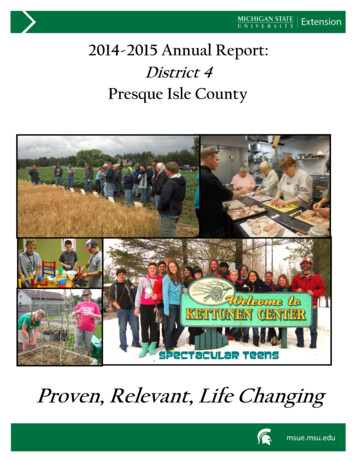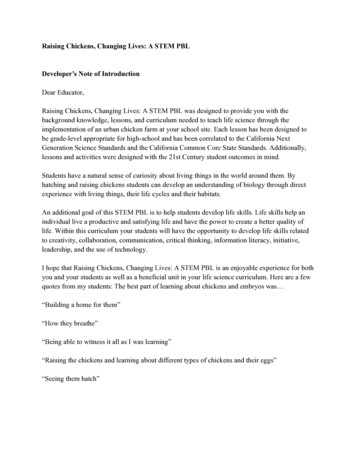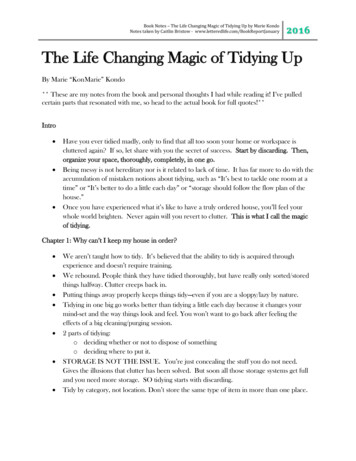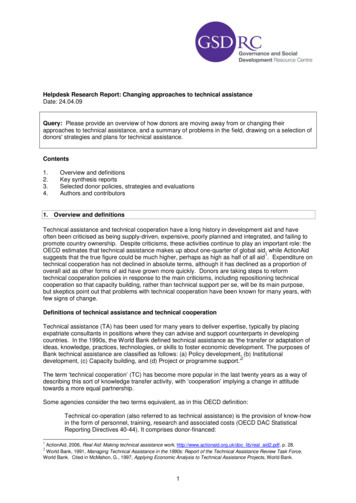
Transcription
2014-2015 Annual Report:District 4Presque Isle CountyProven, Relevant, Life Changingmsue.msu.edu
A MESSAGE FROM THEDISTRICT COORDINATOR:We hope you enjoy reading this latest annual report outlining howMichigan State University Extension in Presque Isle County andthroughout the state continue to make Michigan thrive as an excellentplace to live, raise a family and conduct business. MSU Extensionfaculty and staff members translate the scientific information gleanedfrom MSU AgBio Research and other campus units into real worldapplications, something we have been doing for 100 years. Throughoutthe history of the Cooperative Extension Service, founded through theSmith-Lever Act of 1914, MSUE Extension has worked hard to supportan environment of collaboration where innovation and creativity canflourish. We continue to extend our reach by connecting with moreand more residents each year. This report present the evidence of oursuccesses.MISSION:Michigan State University Extensionhelps people improve their livesthrough an educational process thatapplies knowledge to critical issues,needs and opportunities.Kelley HiemstraDistrict 4 CoordinatorMichigan State University Extension2014 PARTICIPATION NUMBERSCOUNTY OFFICE:4-H Children & Youth programs . 5974-H Members (Traditional Club Enrollment) . 1704-H Adult Volunteers .26School Enrichment Participants . .3874-H Clubs .4Great Lakes Stewardship Initiative . 699Agriculture & Agribusiness programs . 697Natural Resources/Community Vitality .23Health & Nutrition programs . 206Presque Isle County106 E. Huron Ave. , Suite C.Rogers City, MI 49779Phone: (989)734-2168FAX: (989) 734-4116Total Participants from Presque Isle . .1388Through 68 multiple series, workshops and one time presentationMSUE webpage viewings for 2014 (statewide) 2,784,162Presque Isle County area 88Michigan State University is an affirmative action/equal opportunity employer. Michigan State University Extension programs and materials are open to all without regardto race, color, national origin, gender, gender identity, religion, age, height, weight, disability, political beliefs, sexual orientation, marital status, family status or veteranstatus. Issued in furtherance of MSU Extension work, acts of May 8 and June 30, 1914, in cooperation with the U.S. Department of Agriculture. Thomas G. Coon, Director,MSU Extension, East Lansing, MI 48824. This information is for educational purposes only. Reference to commercial products or trade names does not imply endorsementby MSU Extension or bias against those not mentioned.
4-H CHILDREN & YOUTH INSTITUTE4-H offers a wealth of opportunities to youth ages 5 to 19 and to teen and adultvolunteers. Seven guiding principles steer our work: 1) Youth develop positiverelationships with adults and peers. 2) Youth are physically and emotionally safe.3) Youth are actively engaged in their own development. 4) Youth are consideredparticipants rather than recipients in the learning process. 5) Youth develop skillsthat help them succeed. 6) Youth recognize, understand and appreciatemulticulturalism. 7) Youth grow and contribute as active citizens through serviceand leadership. “Learn by doing” takes on a deeper meaning when considered in thecontext of these principles.So just how does this happen? This report will describe the various delivery methodsutilized in 4-H programming in Presque Isle County in 2014 and early 2015.Camps Help Youth Develop The Skills Needed To Make Good Decisions4-H Camps are a summer highlight for youth. They look forward to making newfriends and participating in fun hands-on learning activities. Camps also provideyouth an opportunity to learn the social skills that are needed to interact well withothers, participate in groups, work cooperatively to accomplish goals, and valuedifferences in other people. Camp Ready SET Go! engaged 9 to 12 year olds in science, technology,engineering and math. This overnight camp at Ocqueoc Outdoor Center includedarchery, canoeing, Jump Into Food and Fitness, along with TechXcite Quest forSpeed, Junk Drawer Robotics, fish dissection and building a Rube Goldbergmachine. Sixteen youth from all areas of Presque Isle County and two teencounselors joined nearly sixty other youth from neighboring counties in thisthree day adventure. A one-day Cloverbud Camp allowed 5 to 8 year olds to experience three scienceexperiments, two crafts, a nature scavenger hunt, and recreation. Everyonepitched in to help make lunch. Two teen helpers guided the children through theactivities. ROV Day Camp and Art Day Camp were held simultaneously at OcqueocOutdoor Center. Recreational activities were enjoyed together, as were makingtheir own lunch, and experimenting with photography. Three teen leadersguided the eleven participants in their separate sessions creating multiple artpieces with a variety of mediums, while others designed, built and tested an ROVin a pool and in the lake.Out-of-schoolprograms likecamps andSummerRecreation helpkeep youthengaged anddevelop skillssuch asteamwork,decision makingand goalaccomplishmentthat willenhance theirchances of futuresuccess.msue.msu.edu3
4-H CHILDREN & YOUTH INSTITUTE Great Lakes and Natural Resources Camp, held annually at Camp Chickagami, forseven days, six nights provides hands-on learning, engaging youth ages 13-15 inexploring science, leadership, and careers (and of course, recreation) related toMichigan’s Great Lakes and natural resources. Michigan teens participate in sciencesessions relating to local woodlands and wildlife, Great Lakes invasive species,wetlands, watersheds, fisheries, and more. Campers learn about Michigan’s outdoorsin numerous science-based actives, while exploring potential careers by workingwith professional experts. One Presque Isle teen attended this camp in 2014.ClubsBecause Michigan4-H is part of MSUExtension, theactivities kidsparticipate in are allbacked by andbased on childdevelopmentresearch. We useexperiential (i.e.hands-on) learningand time spentintentionallythinking aboutwhat’s been learnedto make it ameaningfulexperience, withskills and ideaslearned that last alifetime.2014-15 Annual Report4The 4-H Community Garden Club is a great example of youth learning myriad skills in aclub setting. They not only plan what to plant, but where, utilizing a companionplanting guide to maximize productivity. In 2014, they decided to experiment withplanting corn in a mound rather than a raised bed, so the frame was moved to a newlocation and filled with soil, creating an additional planting space. They learnenvironmentally-friendly pest control and water management. Members plan a schedulefor maintenance. When it is time for harvest, they learn to cook what they have raised,and share with the food pantry housed at Westminster Presbyterian Church, oftenincluding recipes to go with the produce.Out of County ExperiencesThe 4-H Teen Leadership and Global Citizenship Spectacular at Kettunen Centerwas attended by fourteen teens from across Presque Isle County and three chaperones.Teens reported: “I gained confidence,” “I learned about people that are different than me,”“I met people from our own county that I didn’t know,” and “I got to know someonefrom another country (Russia).” The weekend conference opened with a culturalscavenger hunt, and workshops focused on global issues including hunger and culturaldifferences, fill your toolbox for successful leadership, telling your story through filmmaking, public speaking, failure resiliency, and conflict resolution.4-H Exploration Days — Exploration Days was held June 18-20 on the MSU campusand had over 2,400 participants 77 Michigan counties. It boasted a science theme andfeatured a Science-palooza, ‘Science in the Movies’ entertainer, and had many sciencethemed sessions. This MSU pre-college program is designed to: increase responsibility,confidence, independence, and accountability; problem-solving, decision-making andtime management skills; communication, teamwork, citizenship and leadership skills;foster the ability to meet new people and make new friends from different places andbackgrounds; develop and expand career and personal interests; increase collegeexploration and access to the MSUcampus and its resources; and giveyouth opportunities to try thingsthat aren’t available in their county.
4-H CHILDREN & YOUTH INSTITUTESpecial Local EventsThree Science Saturday events in different locations engaged youth in using Quest ForSpeed kits to build, test and re-engineer vehicles to improve speed and efficiency.Three teen leaders directed youth to consider what changes and improvements wouldlead them to their speed or distance goal.A day-long Art Exploration event during Spring Break gave budding artists time toexplore textures and unusual tools to create a piece of touchable art.Longer Term Programs4-H Summer Recreation is a six-week, five hours per day, five days per weekeducation and recreation experience for 8 to 12 year olds. Life skills, science concepts,food and health, interpersonal skills, and safety are all woven together with recreation.Fifty-five youth participated under the guidance of five staff and one volunteer juniorhelper. A partnership with Rogers City Elementary School provides a “home base”location for starting and ending the day and when there is foul weather. At other timesevents may occur at the park, playground, museums or nature trails. Free breakfast andlunch are included in the program, thanks to the partnership with the school. Familiesmay register for selected weeks, or the entire program.Rogers City Natural Helpers is a peer-helping program at Rogers City High School.In 2014, 4-H joined Partners in Prevention in providing leadership for this ongoingprogram. The goals of the program are to help young people avoid some of theproblems of adolescence, effectively help friends who are experiencing problems, takegood care of themselves, and improve their school and community. Teens receivetraining in trust and teamwork, listening and other communication skills, effectivelyhelping friends solve problems, expressing limits, and taking good care of themselves.TBL Mentoring matches high school mentors with elementary students in weeklysupervised meetings after school. Partners work on friendship, communication, how totreat others, and how to improve the community. Recreation focuses on cooperativeplay. 4-H collaborates with Partners in Prevention to deliver this program incooperation with Rogers City Elementary School.Partnering with the communityOver time we have invested in durable supplies that are utilized by club leaders, andalso loaned to classroom teachers and others. School classrooms expanded their handson learning with fishing, archery and orienteering (compass and GPS) equipment.Others borrowed LEGO Mindstorms kits and software to practice in preparation fortheir first robotics competition, or use Underwater ROV (Remotely Operated Vehicle)supplies to design, build and test engineering principles. Presque Isle CountySportsman’s Club borrows archery equipment for a youth event during the communityfestival. T-ball equipment was loaned to Rogers City Little League. 4-H hostschildren’s games and hands-on learning activities, and gives away children’s books atcommunity events such as at the Presque Isle County Fair and Flag Day.4-H programsteach youth lifeskills that helpthem succeed inschool andcollege whilepreparing themfor theworkforce,especially highlysought after jobsin science,technology,engineering andmathematics.msue.msu.edu5
AGRICULTURE &AGRIBUSINESS INSTITUTEWhen you support MSU Extension, you help producers develop efficient farming practices thatoptimize the use of inputs to enhance productivity while protecting soil and water resources.Participants in MSU Extension business management programming also learn to improve their use oftime, money and human capital, which helps retain and create agricultural jobs. Together, thesemeasures strengthen Michigan’s economy by encouraging growth of a sustainable and prosperousMichigan food and agriculture system.Examples of programs in which Presque Isle residents participated include:On-Farm Research and EducationGrowers estimatedthat the informationthey received wouldresult in 19 ofsavings or addedrevenue per acreacross 6,900 acres,or 131,100 in total.On-farm research brings locally relevant research-based information directly toproducers, who learn more effectively using this participatory approach. During the2014 season, MSUE Presque Isle Co. collaborated with local growers and industrypartners to complete ten on-farm research projects to investigate crop varieties andmanagement practices that may improve productivity and sustainability of cropproduction on Northeast Michigan farms. In order to share information regarding thiswork, four outreach events were organized.Three field days were offered in August and September of 2014 highlighting soybean,dry bean, malting barley, potato and cover crop research. These events attracted a totalof 91 participants who spent time touring each trial field to learn about themanagement practice or crop varieties that each was designed to investigate.On February 4th, 2015, 28 producers and partners gathered at Alpena CommunityCollege for the first biannual MSUE On-Farm Research Review to synthesize theinformation gained from these research projects and discuss how it might be applied toimprove crop production in 2015. Forty-eight percent of participating producersindicated that they intend to change their production practices based on researchconducted and shared by MSUE in 2014. Growers estimated that these changeswould result in 19.00 of savings or added revenue per acre across 6,900 acres in2015, or 131,100 in total.ControlGypsum2014-15 Annual Report6SMaRT soybean research found that broadcast gypsum increasedsoybean yield by 7 bushels per acre, and net revenue by 34 per acre.
AGRICULTURE &AGRIBUSINESS INSTITUTEFarm Bill Title I WorkshopsThe 2014 Farm Bill, including new programs designed to help producers bettermanage risk, represents one of the most significant reforms to U.S. farm policy indecades. Each farm operation is different, and finding a good fit for risk managementdepends on individual needs. With this in mind, MSU Extension developednumerous Farm Bill resources to assist farmers and landowners.In collaboration with the USDA Farm Service Agency and agribusiness partners,MSUE offered four Farm Bill Title I Workshops across Northeast MI in January 2015,including locations in Petoskey, Rogers City and Alpena (2). The profit and riskmanagement implications of alternative program choices were explored with 56participants under a range of assumptions using the Excel based Farm Bill AnalyzerTool developed by MSUE. Educators also met with individual producers after theworkshop to run detailed analysis of their operations. Information gained throughthis technical assistance allowed local producers to carefully select Farm Bill riskmanagement programs and increase projected farm revenue by 5,000 per yearon average.White-tailed Deer ManagementMSU Extension has partnered with agribusiness, wildlife management agenciesand sportsmen/women to address the complex issue of conflicts between whitetailed deer and agriculture. Previous estimates of dry bean and alfalfa yield loss towildlife in Northeast MI range from 5%- 43%, based on variable habitat quality andpopulation dynamics. In 2014, MSUE held a series of meetings with several partnersto discuss the impacts of deer on agriculture and available management tools.Following this discussion, MI DNR initiated their Deer PLAN habitat grant programwith a new focus on projects that work to address conflicts with agriculture throughdeer habitat modification.In 2015, MSU has formed a new cross disciplinary team to address producer needsrelated to several vertebrate pests including deer, birds, and rodents. MSUE willconduct a deer exclusion study in 2015, funded by the Michigan Soybean PromotionCommittee. It will measure soybean yield loss to deer browsing. It will also identifyfield variables which will drive deer pressure and potential management strategies.Information gainedallowed producersto carefully selectFarm Bill riskmanagementprograms andincrease projectedfarm revenue by 5,000 per yearon average.msue.msu.eduProducers meet at Alpena Community Collegefor the 2015 MSUE On-Farm Research Review7
GREENING MICHIGAN INSTITUTELake Huron—the third largest freshwater lake in the world—reflects a unique andvaluable asset providing ecological, social, and economic opportunity for communitiesof Northeast Michigan. Michigan Sea Grant Extension promotes research, education,and outreach to enhance responsible and sustainable use of our diverse Great Lakesresources. Through MSU Extension, Michigan Sea Grant works with Michigancitizens, industries, and coastal communities to encourage their use, benefits, andenjoyment of Great Lakes resources that positively influences our state’s economy,environment and quality of life. Two examples of our work benefiting coastalcommunities of northeast Michigan include:Revitalizing community values in an ecologically challenged Lake Huron fisheryThree Lake Huron Fisheries workshops, hosted in 2014, brought together nearly 270interested anglers, charter captains, and others with fisheriesresearchers and managers, offering good news up and down thecoastline regarding the resilience of the Lake Huron fishery—despitenegative impacts of aquatic invasive species. Workshops have helpedfishing-dependent businesses adapt to ecological changes, andcommunities foster more positive attitudes toward an improving LakeHuron Fishery.MSU Extensionhelps strengthencommunitiesthrough programsthat teachcommunityleaders how toimplement bestpractices thatkeep communitiessolvent,productive andengaged.2014 –15 Annual Report8Capitalizing on economic values of our fisheries, Michigan Sea Grant providedleadership for: Legends of the Lakes whitefish marketing initiative has helped the commercialfishing industry to brand and market premium Great Lakes whitefish at a highervalue, benefiting Lake Huron commercial fisherman directly. Michigan Catch & Cook program helps charter captains link with local dockside restaurants, allowing charter fishing customers to have their catch-of-the-dayprepared at a local restaurant. Enhancing tourism values, this partnership receivedthe 2013 Governor’s Awards for Innovative Tourism Collaboration. Great Lakes Fisheries Heritage Trail offers coastal tourism promise, bringing tolife today’s Great Lakes fisheries through exploration of the historic fisheries of ourpast. This statewide trail markets northern Lake Huron communities—museums,events, and experiences—to those interested in learning more about our GreatLakes fisheries.
GREENING MICHIGAN INSTITUTENortheast Michigan Great Lakes Stewardship Initiatives: Engaging Youth inCoastal Community Development through Place-based EducationCollectively, our Northeast Michigan Great Lakes Stewardship Initiative(NEMIGLSI) network, NOAA B-WET water education partnership, and Center forGreat Lakes Literacy trainings have invested in promoting Great Lakes Literacy andsupporting a growing place-based education network and culture among our NortheastMichigan schools and communities. This reflects a regional network and partnershipinvestment that has been co-facilitated and supported by Michigan Sea Grant/GMIand 4-H/CYI - close collaboration with our many regional network leadershippartners-since 2006.Approximately 154 teachers in 33 school buildings receive direct support and/orprofessional development opportunities for implementing place-based educationwith their students. Their communities are both the partners and the beneficiary oftheir student’s environment stewardship investments. These students are engaged,across the region, in addressing important, relevant Great Lakes issues andcommunity development goals.During the 2013-2014 school year alone, our NE MI GLSI regional network andpartnership across eight counties engaged 3,274 youth (approximately 20% of youthin targeted counties)—through their learning—in on-the-ground environmentstewardship projects that make a difference in their communities. Across Michigan,the state GLSI network recently released attached report “GLSI 5 years. 50,000 stewards”- during these same five years, our NE MI GLSI network (one of nine GLSI hubsacross Michigan) contributed significantly to this outcome and impact, engaging12,123 youth in stewardship activities across northern Lake Huron communities. Todate, in total, our network programming has now engaged 13,266 youth in placebased stewardship education opportunities.As the 2014-2015 school year kicked off, another 1,852 students have already hitwoods and water of northeast Michigan in service of their communities and localgovernment. Reflecting on this past September, we highlight a few super GREATweeks of place-based stewardship education programming at its best in NortheastMichigan—and the many schools, teachers, and students who were part ofimplementing some amazing, ambitious, impactful environment stewardship projectsin (and with) their local communities.Engaging youth as community leadersthrough place-based education andGreat Lakes Stewardship projects inNortheast MichiganNortheastMichigancommunities,schools and youthstewardshipprojects werefeatured in a placebased educationdocumentary,“Growing upGreen” thatrecently aired onPBS stations acrossour state andcountry.msue.msu.edu9
HEALTH & NUTRITION INSTITUTEThe Supplemental Nutrition Assistance Program - Education (SNAP-Ed) providesnutrition education to Bridge card eligible adults and children. This program focuseson increasing physical activity and improving dietary quality while stretching fooddollars. The ultimate goal of these programs is to promote healthy weightmaintenance and obesity prevention.Highlights of Health and Nutrition Programming inPresque Isle County:In 2014 MSU Extension Nutrition programs were presented to 139 adults and 167youth! Interactive lessons over time have proven to result in increasing dietaryquality and increasing physical activity.150 participants took part in a six-week series of nutrition lessons148 participated in a one-time lesson on healthy lifestyle choices783 contacts were made with adults and youth in 2014Youth Programs:Rogers City Rec -Jump into Food and Fitness (JIFF)Millersburg Summer Youth Program—JIFFOnaway 2nd grade—Show Me NutritionOcquoec 4-H Summer Camp—JIFFAdult Programs:Onaway/Posen Senior Centers—Eat Smart Live StrongP.I. Senior Project FRESH Nutrition educationP.I. Project ConnectRogers City Cooking Matters ClassOnaway Cooking Matters ClassNutrition articles/ newsletters reach P. I. County adults each monthProgramming for P.I. County happens with the cooperation of local partners thatpromote healthy lifestyles, physical activity and good nutrition. Some of those whohelp make these programs happen are: Case Township Community Center, Onawayand Rogers City schools, St. Paul’s Catholic Church, PIOCCA Senior Centers andmany more.2014-15 Annual Report10
HEALTH & NUTRITION INSTITUTEAs with all Health and Nutrition Institute education programs, success isdetermined not only by the number of individuals staff worked with but moreimportantly, how their knowledge or behavior was changed as a result of attendingthe classes.In 2014, these programs reached more than 84,000 adults and youth across the state.Participants reported the following changes:Youth (preschool through second grade) 93 percent of teachers reported that their students demonstrated an increasedawareness of the importance of good nutrition.84 percent of teachers reported that their students were willing to try new foods.73 percent of teachers reported that their students increased their fruitconsumption.67 percent of teachers reported that their students increased their vegetableconsumption.Adults 75 percent of participants demonstrated improvement in one or more nutritionpractices.50 percent of completing participants reported that they increased their dailyvegetable consumption.42 percent of completing participants reported that they increased their dailyfruit consumption.Older adults 51 percent increased their vegetable consumption in a typical day.47 percent increased fruit consumption in a typical day.More than one-quarter of older adults increased the time they spend beingphysically active on a weekly basis.For more information on online resources go to www.msue.anr.msu.edumsue.msu.edu11
Presque Isle County StaffJames DeDecker—Extension Educator, Agriculture andAgribusiness Institutededecke5@msu.eduMary Schalk—4-H Youth Development Program Coordinatorschalk@anr.msu.eduPatti Spinella—MSU Extension Nutrition Instructorspinella@anr.msu.eduKaelie Fessler- 4-H Youth Program Workerfessler5@msu.eduTammy Barrett—Deputy Clerkbarre102@anr.msu.edumsue.msu.edu
Proven, Relevant, Life Changing Presque Isle County . Presque Isle County 106 E. Huron Ave. , Suite C. Rogers City, MI 49779 Phone: (989)734-2168 . pieces with a variety of mediums, while others designed, built and tested an ROV in a pool and in the lake. msue.msu.edu 3 Out










